When it comes to strategy, there’s no such thing as a foolproof plan. In order to ensure things go as planned, you’ll need a comprehensive plan.
Using a Strategy Diamond Model is a simple approach to illustrate how the many elements of an organization’s strategy are interconnected with one another.
This blog will discuss the five parts of the Strategic Diamond Model and when they should be put together to form a coherent plan.
What Is the Strategy Diamond Model?
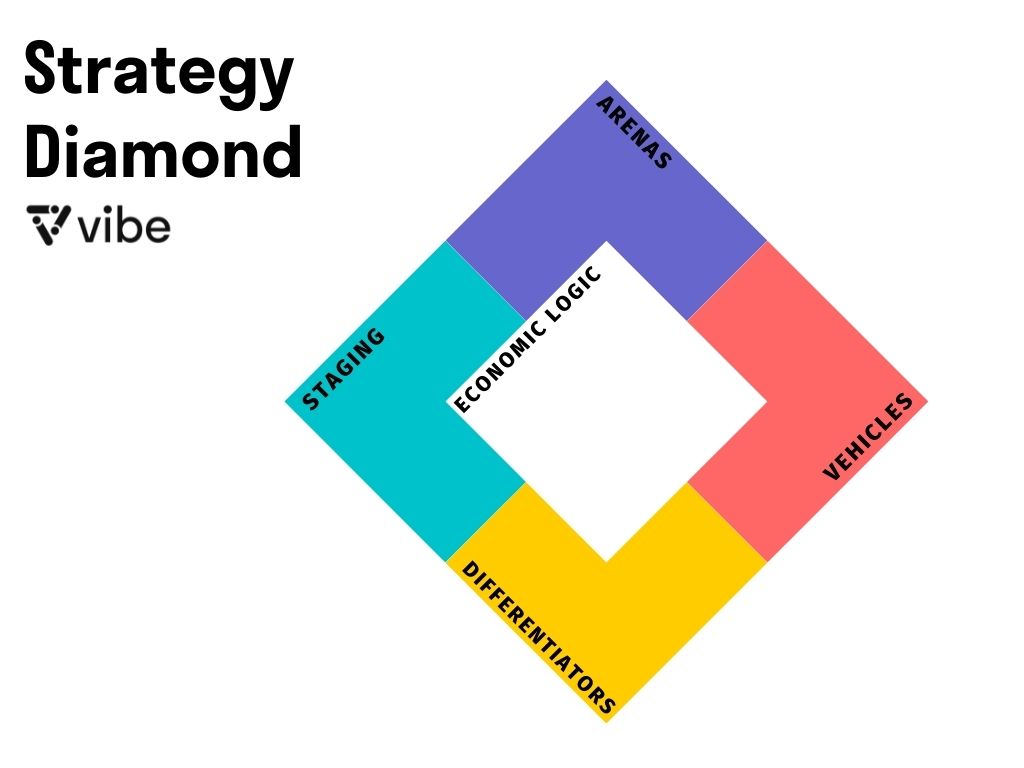
Researchers Don Hambrick and Jim Fredrickson created the Strategy Diamond Model as a tool to help formulate and implement a well-planned strategy by combining its various aspects. Managers and executives can use the information provided by this model to develop a strategic plan and clearly define their organization’s long-term objectives. With the help of this unified approach, you can easily put your well-thought-out plan into action.
Oftentimes, an organizational Strategy Diamond is completed by the executive board and presented to the rest of the company. After this presentation, the business can take this plan and utilize it as a helpful starting point for developing further strategies. That being said, it’s possible to implement this strategy at any level of a company.
The approach is vital because it assists managers in focusing on the crucial strategic decisions they’re now faced with. If you think that two companies have basically the same Strategy Diamond Model, what differentiates the two is not the strategy, but how well they execute it.
To guarantee you have a comprehensive strategic plan, you must address the following five questions:
-
What are we planning to achieve? (Arena)
-
How can we get there? (Vehicles)
-
How do we stand out in the marketplace? (Differentiators)
-
How do we move forward, and how quickly? (Staging)
-
How will we get our returns? (Economic Logic)
We’ll discuss these in greater detail later on.
How Do Strategy Diamonds Work?

While the Strategy Diamond Model might be useful, it shouldn’t be your only resource for creating a long-term plan of action for your business.
You should gather both internal and external data before putting this concept into action. Make sure you have a clear image of your operating area by doing both an internal analysis to identify your organization’s goals and an external scan to discover other physical factors.
Without these data insights, you won’t be able to conduct a thorough strategic analysis and come to well-informed decisions about your plan’s evolution. If you form your plan in a bubble, you may find yourself in a situation where you’re unable to adjust your approach quickly enough to stay ahead of the competition. The Strategy Diamond framework helps you arrange and put together the individual elements of a plan. It also helps you identify any gaps or flaws that may have been overlooked.
One downside of this strategy is that anything your plan doesn’t cover will be determined one way or another. This could either be by external factors, like market disruptions and trends, or by internal factors, such as people ignoring the new plan and continuing normal business operations.
To create a complete and well-organized strategy, you need to gather all relevant data and then use the Strategy Diamond Model to organize it effectively.
Benefits of Strategy Diamonds

While creating your company’s strategy, you may be inclined to give priority to the few issues with which you are most concerned. But your plan won’t be complete without brainstorming all 5 facets of the strategy diamond.
Most strategic plans only address one or two of these factors, leaving room for future issues. A strategy diamond may help you avoid distractions and zero in on what’s most important for your company. If you want a better shot at success, this template can help you see the larger picture.
How to Create a Strategy Diamond Model

In order to create an effective strategy diamond model on paper or brainstorm with an interactive whiteboard, we need to make sure we have all the pieces of the diamond (the 5 areas we talked about earlier) in place.
Arenas
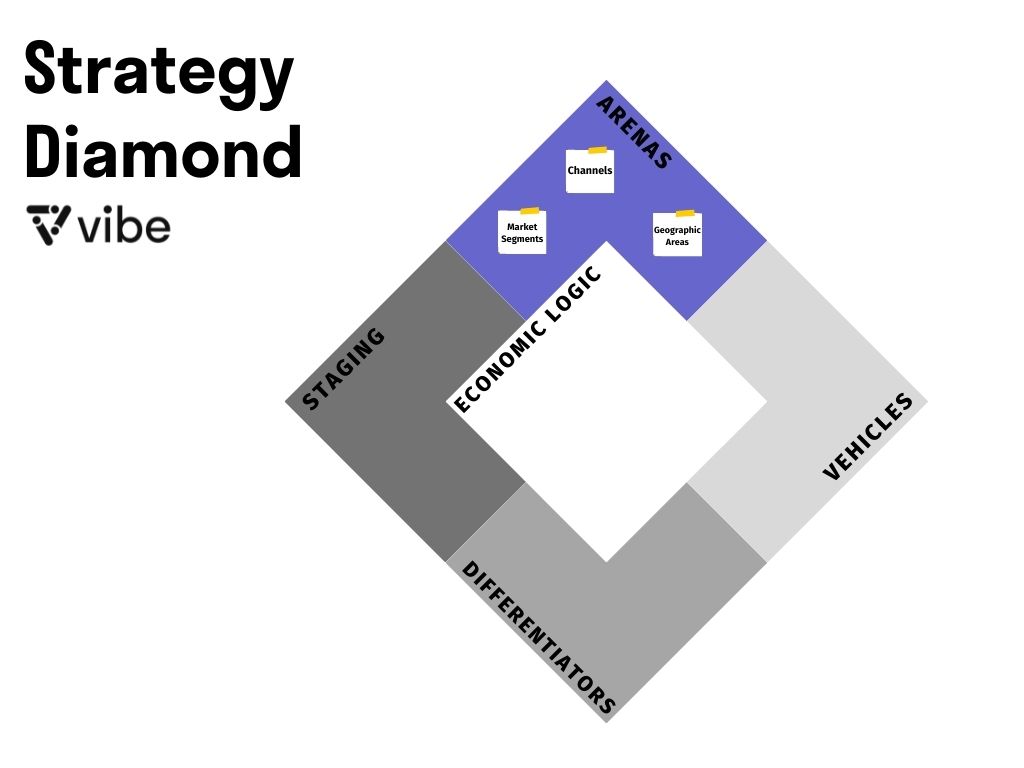
To be successful, a company must be active in the right areas. This encompasses everything from products to markets to technology to locations to methods of value production.
Take the example of Nike and New Balance. While both Nike and New Balance compete in the same market and in the same regions, the value chains in which they participate are quite different. New Balance shoes are made in the USA, whereas Nike shoes are mostly produced in China, Indonesia, and Vietnam.
Vehicles
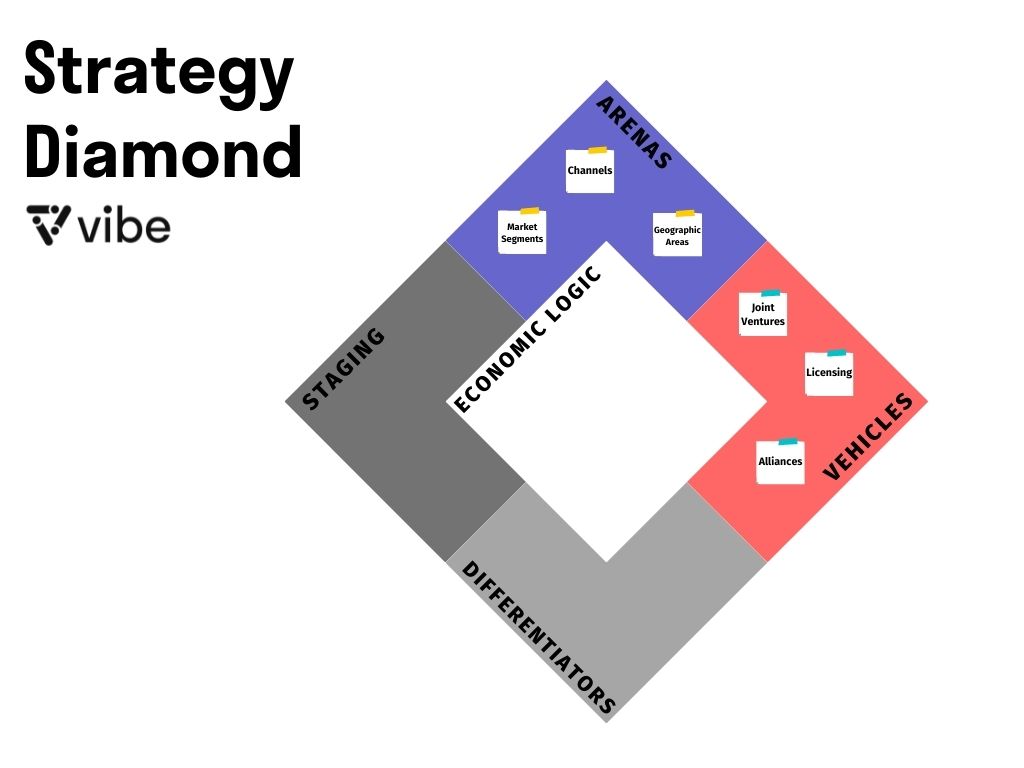
In this element of the Strategy Diamond Model, we focus on the channels via which our company grows its presence in our target markets. This approach may take the shape of a merger, a partnership, an acquisition, a strategic alliance, a franchise agreement, or licensing. Acquiring another company or joining forces with another might help you obtain competitive advantages and hone your skills.
The strategic planners at a biotechnology company, for instance, decided to form joint ventures as the most effective means of expanding the company’s presence in Europe. They also planned to acquire new pharmaceutical products to supplement their existing line of diagnostic products.
Differentiators
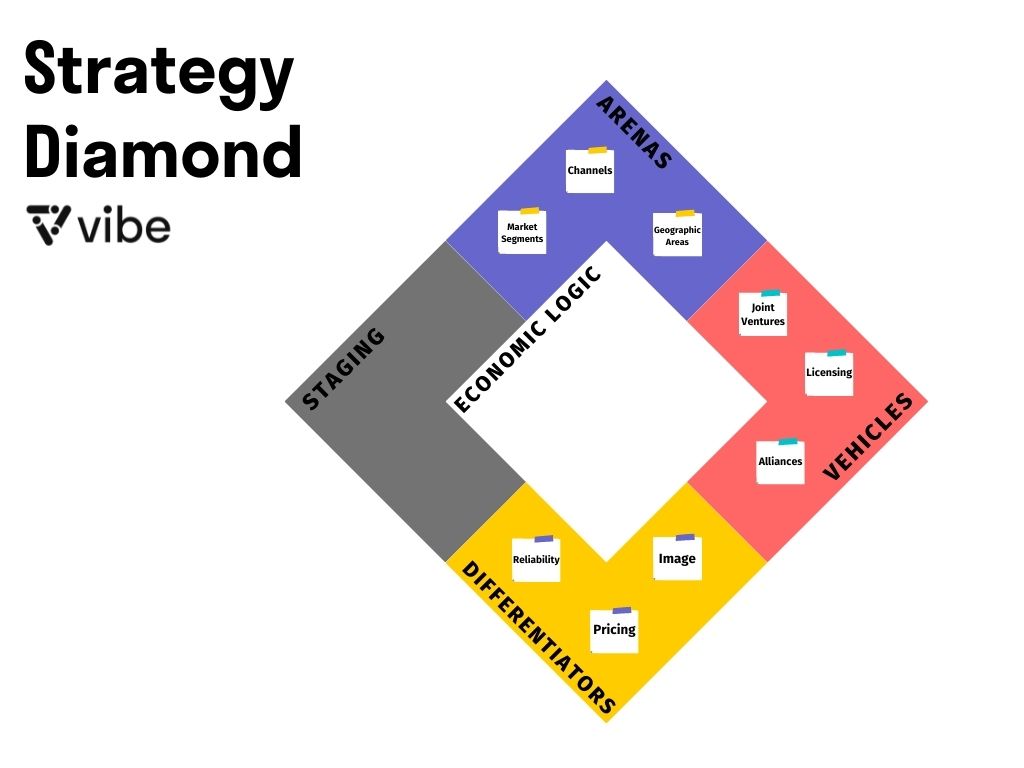
Your plan must focus on setting yourself apart from the competition. No one can succeed if they can’t differentiate themselves or stand out from competitors. Distinguishing features that help set one product apart from another include pricing, quality, customization, dependability and durability, development cycles, product updates, customer service, etc. When filling out this part of your diamond, keep the following in mind:
-
Is there anything that sets you apart from the rest of the market?
-
What makes your products different and better from the competition?
-
How can your business model make it successful?
The sooner you can identify these differentiating factors, the better you’ll have an edge over them. That’s because differentiation isn’t a spontaneous process. You’ll need to invest effort and resources to achieve world-class customer support. You should also put money into product design if you want the best end results.
In 2020, for instance, Zara generated over $14 billion in net profits, making it the most lucrative Inditex brand. How? Zara is the fastest fashion shop in terms of both product delivery and stock replenishment. To do this, it has brought manufacturing in-house and strategically placed its suppliers close to its facilities.
Staging and Pacing
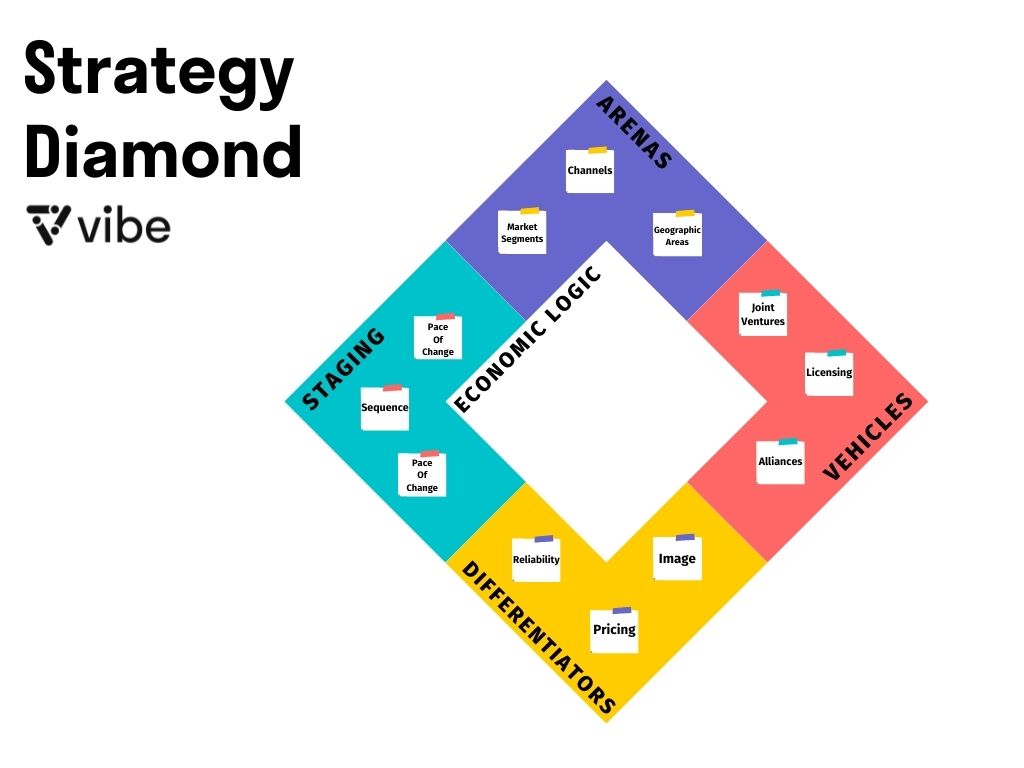
This element is determined by your timeline. The timeline of your long-term objectives will evaluate the speed at which you’ll implement your strategy. It involves how quickly (or slowly) certain operations should move, as well as the steps you need to take to make it happen.
Important things to think about at this stage are:
-
Which sequence of actions should we follow?
-
How quickly should we be making these changes?
For a Strategy Diamond example, let’s say a company that makes printing equipment decided to increase the variety of products it offers and go global. Despite the executives’ best intentions, expanding regionally without the whole line in place would’ve been a waste of time and resources. The executives came to the conclusion that the first stage would include the addition of new products, since the best sales reps they intended to hire (in order to expand globally) would represent a limited product range effectively.
Economic Logic
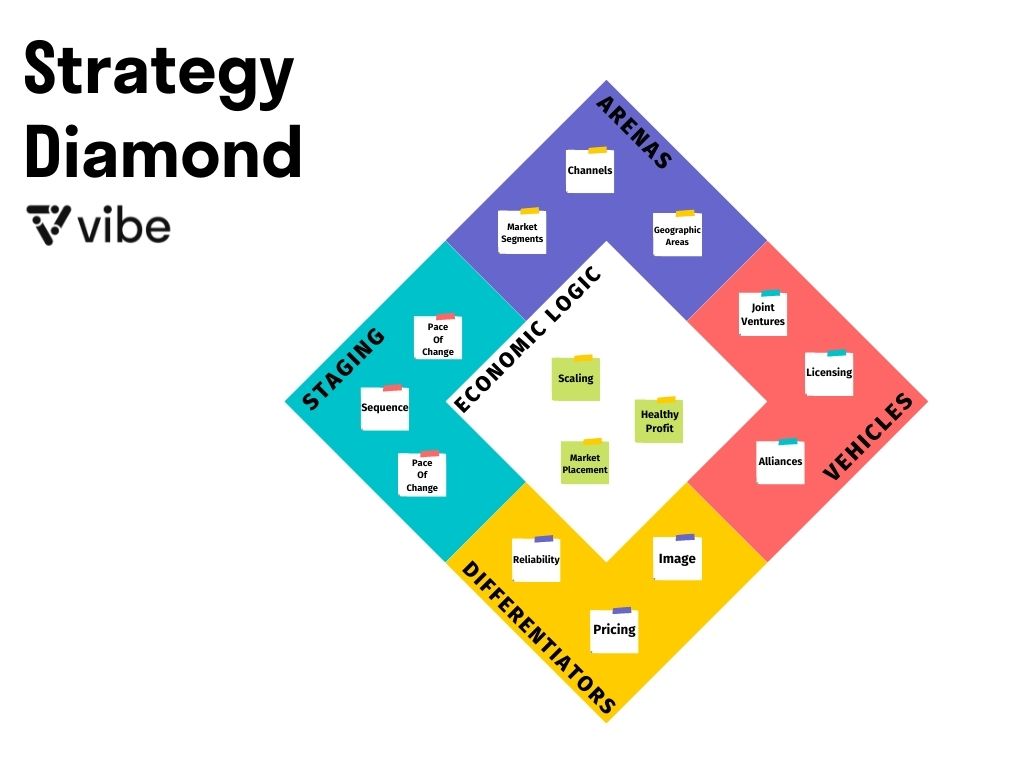
This section boils down to your company model.
Even the biggest corporations need to regularly examine and revise their business model to adapt quickly to changes in the market. The failure of Blockbuster, for instance, was not due to its failure to predict the rise of Netflix, but its failure to adapt its business model fast enough to survive the new competition.
While implementing economic logic, here are some things to think about:
-
How can we make sure we have a healthy profit?
-
How many options for scaling do we have?
-
How can we achieve a premium place in the market?
-
Is our product proprietary? If yes, how much?
The Economic Logic element facilitates research into various strategies for increasing profitability. The reason you save it for last is that it pushes you to double-check your responses to the preceding factors and bring them in sync with one another.
Building a Strategy Diamond Model With Vibe

Utilizing the Strategy Diamond Model is a great resource for creating comprehensive product and market plans—and Vibe can help make the process a whole lot easier. Vibe is an interactive whiteboard device that allows you to easily brainstorm the five elements of this model with your team—from any location and any device. Building a Strategy Diamond with Canvas, Vibe’s interactive whiteboard software, is easy, thanks to easy customization, real-time collaboration, annotation, screen-sharing, and more. With 55- and 75-inch expansive touchscreens, presentations with Vibe can always deliver that ‘WOW’ factor. Use Vibe to introduce your company’s winning approach to investors, clients, and other key stakeholders.
FAQ:
What is the purpose of the Strategy Diamond?
Strategy Diamonds offer a simple and easy way to show how larger parts of a strategy fit together. You can use a Strategy Diamond to break down a potential strategy into five elements and form a coherent business strategy from there.
What are the five elements of the Strategy Diamond?
The Strategy Diamond includes five major elements:
-
Arenas: Products, markets, technology, locations, value production, etc.
-
Vehicles: Mergers, partnerships, acquisitions, licensing, etc.
-
Differentiators: Pricing, dependability, quality, durability, etc.
-
Staging and Pacing: Sequence of actions, pace of operations, etc.
-
Economic Logic: Company model, profit, market placement, etc.








-1sbltxxq4FYxHrXrwJVLsCDNsXpqNa.webp)
-5Zp0pmSytvcuYDVs1LvuwplKuRneK0.webp)

